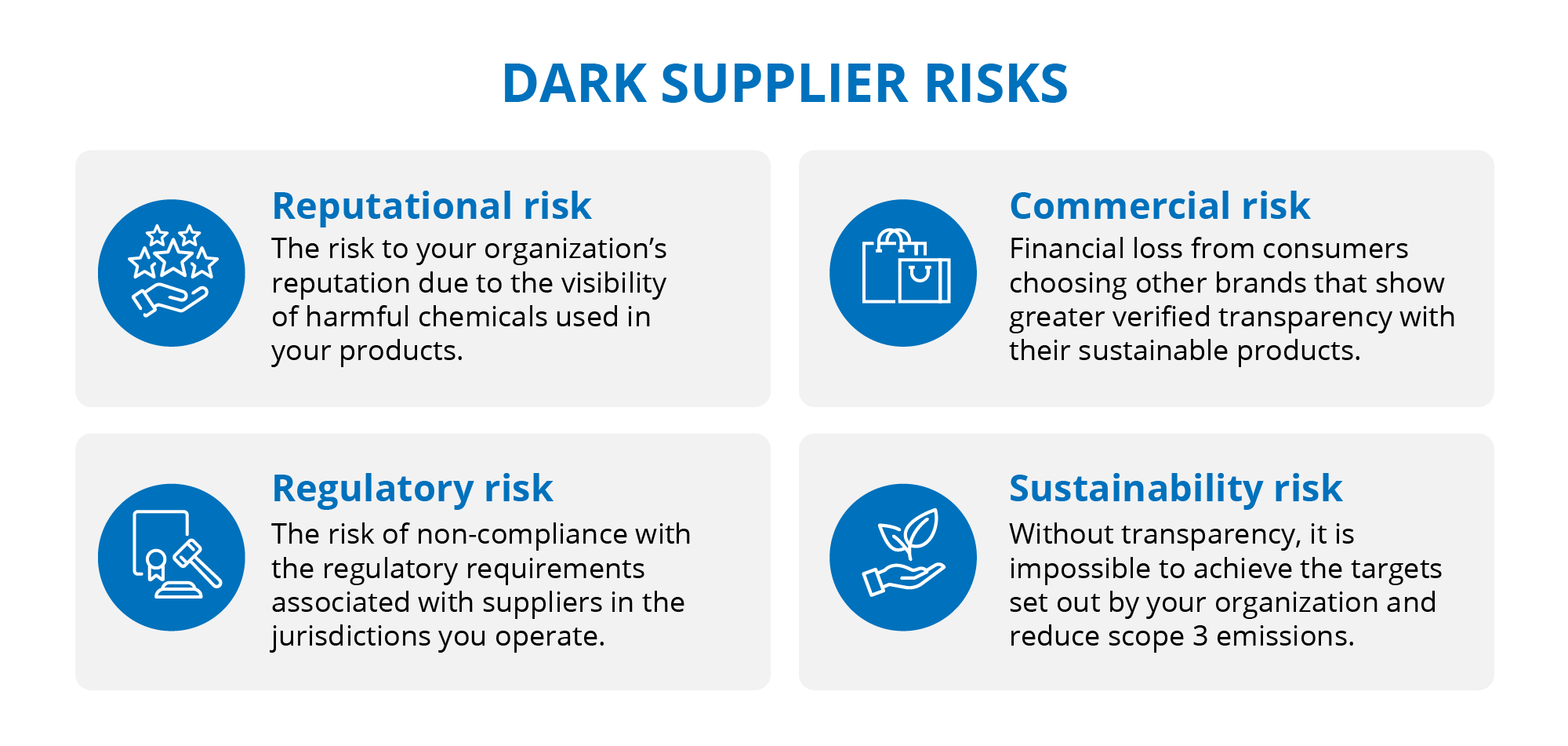4 Risks to Avoid in Your Supplier Risk Management Strategy
Article
Run from those dark supplier risks! Avoid the four types of risk that could negatively impact your organization.
As a part of your supplier risk management strategy, you’ll want to become more familiar with the risk categories, since risks can multiply the larger the supply chain and the less visible supplier operations and data are. While there has been a lot of progress in the textile and fashion industry over recent years, most of the change has happened from the top down, starting with consumer brands. Driven by the need to share their environmental performance data and sustainability credentials with stakeholders and consumers, brands have had to adapt their operating models quickly to align with new ESG commitments and net-zero targets.
As you travel further down the supply chain, this commitment to change is less apparent and sometimes unknown. Of course, this isn’t true for all suppliers, some are committed to better manufacturing processes, safer use of chemicals and providing full transparency of their emissions data. These transparent suppliers are highly sought after by today’s brands; however, they are few and far between. A recent study revealed that a shocking 94% of companies admit they don’t have full visibility into their supply chains, and this is where organizations could be facing very high risks.
What are the 4 Different Types of Supplier Risks to Avoid?
- Reputational risk – The risk to your organization’s reputation due to the visibility of harmful chemicals used in your products.
If you cannot track what chemicals are being used for which processes in your supply chain, you cannot manage this, nor ensure compliance. If you are found to be using dangerous chemicals, you could face reputational risk and damages. Considering it takes over 8,000 chemicals to turn raw materials into textiles, that’s a lot of processes to track and evidence, leaving organizations and value chains open to plenty of potential risks.
Recently, fast-fashion company Shien came under fire for the use of 5 toxic chemicals in their clothing along with other large clothing brands like Lululemon, Old Navy and REI. Having these findings plastered across global publications is damaging enough, but long exposure to some of these chemicals can also be life-threatening, causing a whole new set of risks for an organization.
- Regulatory risk – The risk of non-compliance with the regulatory requirements associated with suppliers in the jurisdictions you operate.
The costs of non-compliance are steep, often including fines, sometimes closures and even imprisonment. With so many new and updated regulations for different industries, operations and jurisdictions, it’s a compliance team’s nightmare to keep track of the current risks to a business.
In December 2021, REACH found that from inspections of nearly 6,000 products (including textiles, leather, childcare articles, toys and jewelry), 78% were non-compliant. At least one requirement under relevant EU chemicals legislation was checked, resulting in over 5,000 enforcement actions.

- Commercial risk – Financial loss from consumers choosing other brands that show greater verified transparency with their sustainable products.
There has been a significant rise in the number of eco-conscious consumers over recent years, as people have become more aware of the carbon and wastewater emissions impacting the planet. There is no shortage of evidence suggesting that consumers want more sustainable brands. One of the more recent US surveys revealed that up to 80% of consumers indicate that they already consider sustainability in their day-to-day choices. However, this change in consumer demands has led to a greenwashing culture to appeal to these customers. Brands that display disingenuous environmental performance data, or no data at all, face financial risks from government penalties as well as a loss in customer sales.
To battle against these false sustainability claims, authorities, such as the UK’s Competition and Markets Authority (CMA), announced they would be naming and shaming brands that make false claims about their environmental credentials in a crackdown on the fashion industry. Boohoo, ASOS and Asda are currently facing greenwashing investigations from the UK regulator. And on the horizon is the European Commission’s Product Environmental Footprint (PEF) initiative, which will provide labelling throughout the EU to give consumers and businesses the ability to choose more environmentally-friendly products.
- Sustainability risk – Without transparency, it is impossible to achieve the targets set out by your organization and reduce scope 3 emissions.
If you cannot capture all your emissions data throughout the supply chain, you cannot know your true environmental impact, and subsequently, share this information publicly with confidence. You also won’t be able to set realistic targets or track your performance for ongoing improvements. This is the sustainability risk, which can easily be eradicated with the right technology and processes.
Recently there have been many new environmental programs introduced for brands to help change the textiles industry and encourage more sustainable apparel choices for consumers, such as the Carbon Disclosure Project (CDP), the United Nations Alliance for Sustainable Fashion and the Global Fashion Agenda. On the flip side, platforms have also been set up to inform consumers of the most ethical and sustainable brands, such as goodonyou.eco. Good On You is a sustainability ratings platform made public for businesses and consumers. A fashion brand that ranks low on these types of lists can result in dire consequences for your future sales.
Reduce the Dark Suppliers in Your Supply Chain
Reducing the number of Dark Suppliers (suppliers that do not disclose emissions data or seek to improve their environmental performance) needs to be a top priority for leading brands that want to reduce their risk as a part of their supplier risk management strategy. Brands should first work on their existing supplier partnerships to agree on the information that needs to be disclosed for their sustainability reporting. Remember, this data should be submitted accurately, honestly and consistently. As a last resort, brands should consider sourcing new, more transparent suppliers in place of those that won’t participate in their verifiable sustainability programs or goals.
Learn how we can engage your supply chain, improve your chemical management initiatives and demonstrate progress toward your chemical commitments. https://www.cleanchain.com/for-brands/









